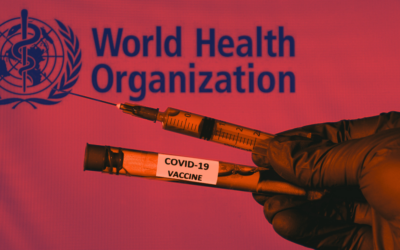World Health Organization

WHO Passes ‘Pandemic Agreement’ Even Though Pretty Much None Of Us Agreed To It
This article was originally published in-part by Million Voices. Click here to read more. The World Health Organization (WHO) adopted a global pandemic agreement on May 20, allowing the unelected group of representatives to create “legally binding” rules for the masses should another disease spread throughout our species. The full agreement is designed to better prevent, prepare, and respond to any potential mass disease outbreak. “This includes through the equitable and timely access to vaccines, therapeutics and diagnostics,” WHO members said in a statement accompanying the agreement. The WHO Agreement only applies to the nation states that have officially signed it, which does not include the U.S. The U.S. was not part of the final stages of the pandemic agreement process following President Donald Trump’s decision to leave WHO, according to The Associated Press. (MORE NEWS: Kay Hill On Biden’s Info Blackout & The Solar Flare Threat No One’s Talking About) WHO is run by unelected (via public democratic process) Director General Tedros Ghebreyesus, who claimed the world is now “safer” as a result of the agreement. “The Agreement is a victory for public health, science and multilateral action. It will ensure we, collectively, can better protect the world from future pandemic threats. It is also a recognition by the international community that our citizens, societies and economies must not be left vulnerable to again suffer losses like those endured during COVID-19,” he added. Britain Signs Despite Previous Stance U.S. ally, Great Britain, adopted the agreement, claiming it would “protect [the] British public and NHS from future global health threats while preserving UK sovereignty,” and “will safeguard lives and [the] UK economy by improving [the] world’s collective ability to prevent, prepare for, detect and respond to global disease threats.” These statements fly in the face of previous statements from the British government. In May 2024, Britain was preparing to reject the agreement on the grounds that it created something of a “New World Order,” handing over mass control of medical, health, food, and other major infrastructural systems to a completely unelected group of people. Analysis From Others “Anyone who isn’t a fan of the coming global surveillance superstate is right to be concerned about the recent approval of the WHO Pandemic Agreement at the World Health Assembly meetings in Geneva. The point not to miss is that this sets in place a precedent for a global legal and policy architecture that will make it normative for more control to be consolidated in the hands of a few,” Family Research Council vice president of Policy and Government Affairs’ Travis Weber told the Washington Stand. (EXCLUSIVE: Cash Flowing Into Anti-ICE Group’s Coffers Came From Chinese Gov’t-Linked Sources) “The next global crisis may not be from a virus; but it will likely be a ‘health emergency’ that will be used to once again justify infringements on individual human rights and freedoms. On top of that, accelerating progress on AI will allow such global control to be very intrusive and very effectively manipulated in the hands of a few.” The WHO “agreement” also (according to another analysis from the Washington Stand): threatens national sovereignty; equates the health of humans with animals and plants; establishes a global super-government of unelected bureaucrats, who may alter the agreement at any time; transfers one-fifth of all U.S. vaccines and emergency equipment to WHO and regular monetary contributions to “developing countries” (a category that includes China); requires nations to follow WHO regulations on “routine immunization” and “social measures” including lockdowns, mask mandates, and social distancing; calls on nations to study factors that reduce public “trust” in government pandemic policies, such as mask and vaccine mandates or social distancing; would empower private-sector forces such as social media companies to ramp up censorship of disfavored viewpoints; aims to create equity-driven, universal national health care systems around the globe; does not define the terms “pandemic,” “gender,” or “women”; and has a “Hotel California” provision stating that a nation can never discharge any “obligations which accrued while it was a Party to the WHO Pandemic Agreement,” even after it withdraws. Read The Text In Full TMM Analysis We can, of course, continue to ignore the unelected authority of WHO members and pray that no future elected official of this nation bows to them during some hypothetical future pandemic. Many people ignored their rules during the COVID-19 pandemic, and they’re now falling on the right side of history. We’ve done it once, we can do it again, America. But we can only do it if we keep using our voice. Do You Know How Your Local, State & Federally Elected Officials Feel About WHO? If you care about any of the issues you learned about today, you should consider contacting your locally elected official to voice your concerns. Did you know that if a politician — from your local town Mayor, all the way up through Congress — receives as few as 10 letters on the same issue, they will be forced to take action? Learn more about this brilliant political loophole by joining Million Voices today.

